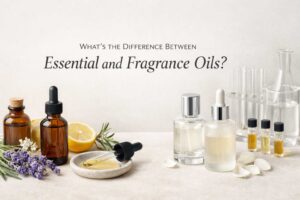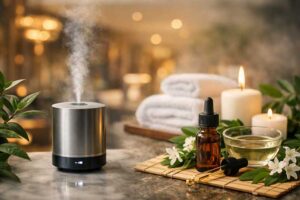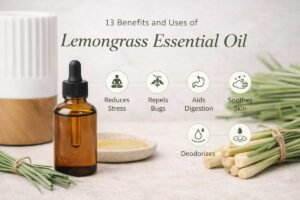
9 Types of Essential Oil Diffusers
- November 17, 2023
Essential oil diffusers, pivotal in aromatherapy, have enhanced atmospheres for decades. As the desire for personal wellness and ambient tranquillity grows, diffusers have diversified into nine distinct types, each meeting unique needs and preferences. These variants cater to various environments, from cozy homes to bustling offices.
The classification of these diffusers is based on their operational mechanisms and the sensory experiences they offer. Some are designed for simplicity and subtlety, while others boast advanced features for a more immersive aromatic experience.
For enthusiasts seeking the perfect diffuser, our comprehensive guide explores the diverse types of diffusers and delves into their optimal use cases, ensuring a harmonious blend of scent and space.
Table of Contents

Nebulizing Diffuser

Nebulizing diffusers are the best of the essential oil diffuser family, renowned for their efficient and pure dispersion of aromas. Characterized by their ability to atomize essential oils without water or heat, these diffusers deliver essence in its purest form. The high-velocity air stream in nebulizing diffusers breaks down the oil into micro-particles, ensuring a potent and therapeutic aromatic experience.
Pros of a nebulizing diffuser
– Ensures delivery of oils in their purest state, maintaining chemical integrity.
– Produces a Rich and original aroma, maximizing the aromatic benefits.
– No water usage, resulting in a concentrated fragrance output.
– Often equipped with timers for personalized usage.
Cons of a nebulizing diffuser
– Higher cost compared to other diffuser types.
– Increased consumption of essential oils due to concentrated diffusion.
– May produce noise due to the nebulizing mechanism.
Nebulizing diffusers excel in delivering an intense and pure aromatic experience, making them a prized choice for aroma connoisseurs.
Ultrasonic Diffusers
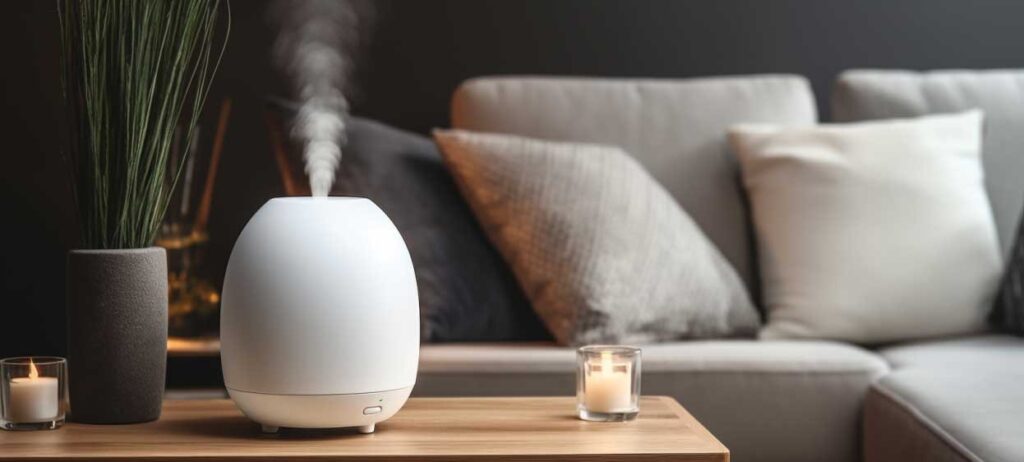
Ultrasonic diffusers are a compelling segment of essential oil diffusers, distinguished by their unique use of high-frequency vibrations. These diffusers stand out by emitting a fine mist, a blend of water and essential oils, into the air. The ultrasonic technology vibrates a small disk under the water surface, transforming the mixture into micro-particles that create a soothing mist.
Pros of an ultrasonic diffuser
– Maintains the integrity of essential oils, ensuring full therapeutic benefits.
– Acts as a mini humidifier, adding moisture to the air, which is beneficial in dry conditions.
– A diverse array of models and features catering to various preferences.
– Typically quieter and more affordable than nebulizing diffusers.
Cons of an ultrasonic diffuser
– Dilution of aroma due to water usage.
– Potential for less effective humidification in larger spaces.
Applications
Ultrasonic diffusers are versatile and ideal for enhancing indoor environments. They are particularly suited for home or office settings, providing both aromatherapy and humidification and are beneficial in dry climates or during colder months.
Passive Diffusers
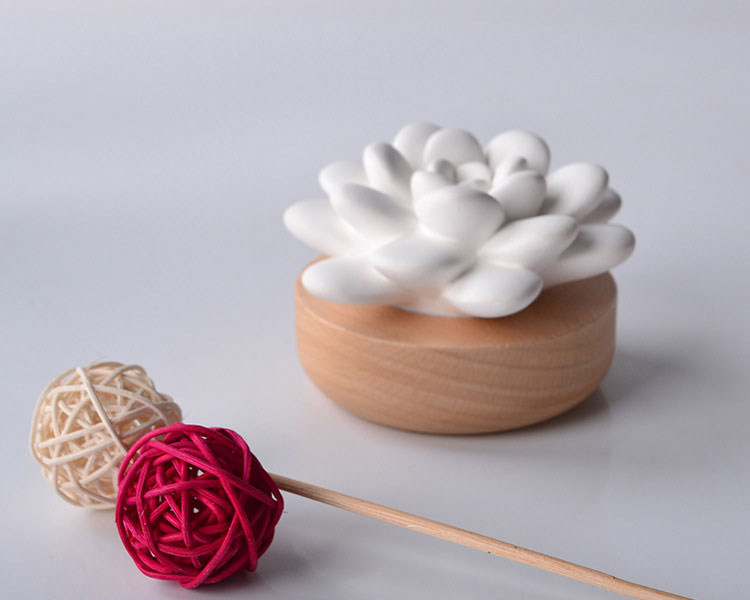
Passive diffusers operate on the principle of natural evaporation, distinct from their mechanically active counterparts. These diffusers, known as non-electric or natural, disseminate essential oils into the air without heat, water, or electricity.
Pros of a passive diffuser
– Effortless operation with no need for power sources.
– Offers a subtle and constant fragrance diffusion.
– Simple and elegant design, blending seamlessly into various decors.
– Ideal for continuous, low-maintenance aroma diffusion.
Cons of a passive diffuser
– Limited intensity and range of scent distribution.
– May require frequent reapplication of essential oils.
Applications
Passive diffusers are well-suited for smaller, personal spaces like work desks or bedside tables. They are also perfect for environments with impractical electronic diffusers, offering a consistent yet gentle aromatic presence.
Heat Diffusers

Heat diffusers are an integral part of the essential oil diffuser family and are widely recognized for their simplicity of operation. These diffusers utilize heat, often from an electric source or a candle, to gently warm and evaporate the essential oils into the air. The linear manner in which the heat is applied allows for an even and effective aroma dispersion.
Pros of a heat diffuser
– Simplicity in design and usage.
– Effective in spreading a consistent scent.
– Suitable for various types of essential oils, significantly thicker varieties.
– Often more affordable than other diffuser types.
Cons of a heat diffuser
– Potential alteration of the oil’s therapeutic properties due to heat.
– There is no way to control the intensity of the scent precisely.
Applications
Heat diffusers are excellent for creating a warm and inviting ambiance in home settings. They are handy for short-term aromatic experiences and are well-suited for spaces where a subtle, continuous fragrance is desired.
Reed and Stone Diffusers

Reed and stone diffusers embody a simple yet effective approach in the family of essential oil diffusers; these diffusers operate through the natural process of capillary action and absorption, requiring no electricity or heat.
Pros of the reed and stone diffusers
– Reed diffusers offer a steady and consistent scent distribution
– Stone diffusers subtly diffuse the aroma throughout the area.
– Both types are low-maintenance and easy to set up,
– Ideal for continuous aroma diffusion without the need for active monitoring.
Cons of the reed and stone diffusers
– Limited in their scope of fragrance intensity and coverage,
– May require regular essential oil refills
Applications
Reed and stone diffusers are optimal for personal spaces, such as bedrooms, offices, or smaller living areas, where a gentle and continuous aroma is desired. These diffusers blend seamlessly into the environment, providing aesthetic value and functional fragrance diffusion.
Personal Diffusers
Personal diffusers cater to individual aromatherapy needs, providing a targeted and personal aromatic experience. Designed for personal use, they often employ absorbent materials or wicks to diffuse essential oils in a controlled manner.
Pros of a personal diffuser
– Precise and efficient in delivering essential oils,
– Ideal for personal space and on-the-go usage
– Minimal effort needed for operation
Cons of a personal diffuser
– Limited in scope, primarily for individual use
– Frequent reapplication of oils may be required
Applications
Personal diffusers excel at providing a customized aromatherapy experience, suitable for workspaces, travel, or small private areas. These diffusers offer a discreet and portable option for essential oil enthusiasts. They are particularly beneficial for those seeking a personal, concentrated aroma experience.
Evaporative Diffusers

Evaporative diffusers utilize the natural airflow to diffuse essential oils; these diffusers distribute scent through an evaporation process involving a filter or pad.
Pros of an evaporative diffuser
– Simple, efficient design without complex component
– Ideal for consistent, gentle diffusion of aromas in smaller spaces.
– Low maintenance
Cons of an evaporative diffuser
– Limited effectiveness in large areas
– May deliver an uneven scent distribution.
Applications
Evaporative diffusers are best suited for personal spaces or areas where subtle, continuous fragrance and simple flow control are desired.
Air Ionizing Diffusers
Air Ionizing Diffusers in the essential oil diffuser family stand out with their unique air-purifying capabilities. These diffusers utilize negative ions to cleanse the air and distribute essential oils.
Pros of an air ionizing diffuser
– Eliminates airborne pollutants and purifies the air.
– Diffuse essential oils effectively, creating a refreshing atmosphere.
– Fast and efficient in operation
Cons of an air-ionizing diffuser
– May require periodic maintenance
– Best suited for specific applications, less versatile than other diffusers.
Applications
Air Ionizing Diffusers are ideal for environments where air quality is a concern, such as living spaces or offices. They excel in providing both air purification and aromatherapy,
Car Essential Oil Diffusers

Car Essential Oil Diffusers offer a custom solution for enhancing vehicle ambiance. These diffusers maintain a balanced aromatic environment in cars,
Pros of a car essential oil diffuser
– Versatile in use, fitting various car models.
– Effective in transforming car interiors with pleasant scents.
– Convenient and easy to operate
Cons of a car essential oil diffuser
– Limited to car environments
– Performance may vary based on car interior dynamics.
Applications
Car Essential Oil Diffusers are ideal for drivers and passengers who wish to elevate their driving experience with therapeutic scents.
In Summary
Exploring 9 types of essential Oil Diffusers, we find that each diffuser type offers unique advantages, Meeting Different Aromatherapy Needs. Understanding these variations enables one to select the perfect diffuser, enhancing personal spaces with desired scents and benefits.

